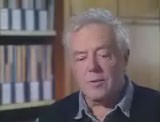<< Previous | Displaying results 301-350 of 571 for "" | Next >>
-
Ludmilla Page describes conditions in Oskar Schindler's munitions factory in Brünnlitz
Oral HistoryLudmilla was born to an assimilated Jewish family in Kishinev, Romania. She and her mother, a physician, were living in Poland when the Germans invaded on September 1, 1939. They were taken to Krakow. Ludmilla was forced to live in the Krakow ghetto; her mother was sent to the Warsaw ghetto. Ludmilla worked in a factory at the Plaszow labor camp for a businessman who was a friend of the German industrialist Oskar Schindler. In October 1944, Schindler attempted to save some Jewish workers by relocating them…
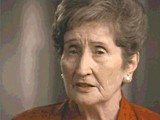
-
Leopold Page describes an act of sabotage and clandestinely listening to radio broadcasts while in Bruennlitz
Oral HistoryLeopold was a teacher in Krakow, Poland, when World War II began in 1939. While serving in the Polish army, he was captured by Germans. Leopold escaped from a prisoner-of-war transport. Soon after, he met the German industrialist Oskar Schindler. The two became friends. Leopold was forced to live in the Krakow ghetto. He later worked in Schindler's factory in Bruennlitz. He and the other Jews who worked there were treated relatively well and protected from the Nazis. After the war, Leopold moved to the…
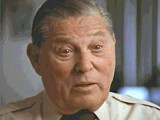
-
Ludmilla Page describes sabotage during production of munitions in Oskar Schindler's factory in Brünnlitz
Oral HistoryLudmilla was born to an assimilated Jewish family in Kishinev, Romania. She and her mother, a physician, were living in Poland when the Germans invaded on September 1, 1939. They were taken to Krakow. Ludmilla was forced to live in the Krakow ghetto; her mother was sent to the Warsaw ghetto. Ludmilla worked in a factory at the Plaszow labor camp for a businessman who was a friend of the German industrialist Oskar Schindler. In October 1944, Schindler attempted to save some Jewish workers by relocating them…
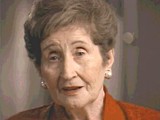
-
Ludmilla Page describes a celebration of Oskar Schindler's birthday in Bruennlitz toward the end of the war
Oral HistoryLudmilla was born to an assimilated Jewish family in Kishinev, Romania. She and her mother, a physician, were living in Poland when the Germans invaded on September 1, 1939. They were taken to Krakow. Ludmilla was forced to live in the Krakow ghetto; her mother was sent to the Warsaw ghetto. Ludmilla worked in a factory at the Plaszow labor camp for a businessman who was a friend of the German industrialist Oskar Schindler. In October 1944, Schindler attempted to save some Jewish workers by relocating them…
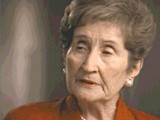
-
US veteran Tarmo Holma describes encountering camp survivors
Oral HistoryTarmo Holma is a veteran of the 11th Armored Division. During the invasion of German-held Austria, in May 1945 the 11th Armored (the "Thunderbolt" division) overran two of the largest Nazi concentration camps in the country: Mauthausen and Gusen.
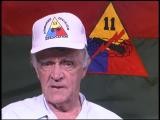
-
Charles Torluccio describes liberation and the role of medical staff
Oral HistoryCharles Torluccio is a veteran of the 11th Armored Division. During the invasion of German-held Austria, in May 1945 the 11th Armored (the "Thunderbolt" division) overran two of the largest Nazi concentration camps in the country: Mauthausen and Gusen.
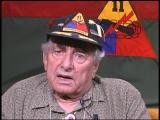
-
John D. Rastelli describes entering occupied Austria and burial of the dead in Mauthausen
Oral HistoryJohn D. Rastelli is a veteran of the 11th Armored Division. During the invasion of German-held Austria, in May 1945 the 11th Armored (the "Thunderbolt" division) overran two of the largest Nazi concentration camps in the country: Mauthausen and Gusen.
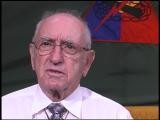
-
Darrell Romjue describes how US troops encoutered camps such as Mauthausen
Oral HistoryDarrell Romjue is a veteran of the 11th Armored Division. During the invasion of German-held Austria, in May 1945 the 11th Armored (the "Thunderbolt" division) overran two of the largest Nazi concentration camps in the country: Mauthausen and Gusen.
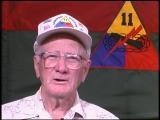
-
US veteran Ross Snowdon describes the camp quarry and barracks and the burial of the dead in Mauthausen
Oral HistoryRoss Snowdon is a veteran of the 11th Armored Division. During the invasion of German-held Austria, in May 1945 the 11th Armored (the "Thunderbolt" division) overran two of the largest Nazi concentration camps in the country: Mauthausen and Gusen.
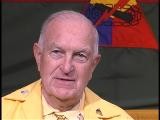
-
Thomas Buergenthal describes the liberation of the Sachsenhausen camp
Oral HistoryThomas's family moved to Zilina in 1938. As the Slovak Hlinka Guard increased its harassment of Jews, the family decided to leave. Thomas and his family ultimately entered Poland, but the German invasion in September 1939 prevented them from leaving for Great Britain. The family ended up in Kielce, where a ghetto was established in April 1941. When the Kielce ghetto was liquidated in August 1942, Thomas and his family avoided the deportations to Treblinka that occurred in the same month. They were sent…
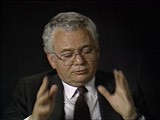
-
Thomas Buergenthal describes the impact of the Nuremberg trials on the development of international law
Oral HistoryJudge Thomas Buergenthal was one of the youngest survivors of the Auschwitz and Sachsenhausen concentration camps. He immigrated to the United States at the age of 17. Judge Buergenthal devoted his life to international and human rights law. He served as chairman of the United States Holocaust Memorial Museum’s Committee on Conscience; was named the Lobingier Professor of Comparative Law and Jurisprudence at the George Washington University Law School; and served for a decade as the American judge at…
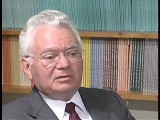
-
Thomas Buergenthal reflects on the value of truth commissions
Oral HistoryJudge Thomas Buergenthal was one of the youngest survivors of the Auschwitz and Sachsenhausen concentration camps. He immigrated to the United States at the age of 17. Judge Buergenthal devoted his life to international and human rights law. He served as chairman of the United States Holocaust Memorial Museum’s Committee on Conscience; was named the Lobingier Professor of Comparative Law and Jurisprudence at the George Washington University Law School; and served for a decade as the American judge at…
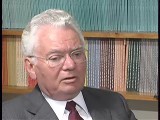
-
Thomas Buergenthal describes the significance of the Nuremberg trials to him both personally and as a lawyer and judge
Oral HistoryJudge Thomas Buergenthal was one of the youngest survivors of the Auschwitz and Sachsenhausen concentration camps. He immigrated to the United States at the age of 17. Judge Buergenthal devoted his life to international and human rights law. He served as chairman of the United States Holocaust Memorial Museum’s Committee on Conscience; was named the Lobingier Professor of Comparative Law and Jurisprudence at the George Washington University Law School; and served for a decade as the American judge at…
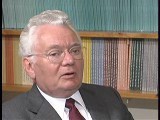
-
Thomas Buergenthal discusses quote from Abel Herzberg
Oral History"There were not six million Jews murdered; there was one murder, six million times."Holocaust survivor Abel Herzberg Judge Thomas Buergenthal was one of the youngest survivors of the Auschwitz and Sachsenhausen concentration camps. He immigrated to the United States at the age of 17. Judge Buergenthal devoted his life to international and human rights law. He served as chairman of the United States Holocaust Memorial Museum’s Committee on Conscience; was named the Lobingier Professor of Comparative Law…
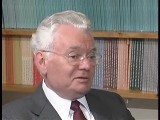
-
Thomas Buergenthal describes the charges brought at the International Military Tribunal at Nuremberg
Oral HistoryJudge Thomas Buergenthal was one of the youngest survivors of the Auschwitz and Sachsenhausen concentration camps. He immigrated to the United States at the age of 17. Judge Buergenthal devoted his life to international and human rights law. He served as chairman of the United States Holocaust Memorial Museum’s Committee on Conscience; was named the Lobingier Professor of Comparative Law and Jurisprudence at the George Washington University Law School; and served for a decade as the American judge at…
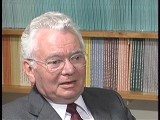
-
Thomas Buergenthal describes differing perspectives on international justice
Oral HistoryJudge Thomas Buergenthal was one of the youngest survivors of the Auschwitz and Sachsenhausen concentration camps. He immigrated to the United States at the age of 17. Judge Buergenthal devoted his life to international and human rights law. He served as chairman of the United States Holocaust Memorial Museum’s Committee on Conscience; was named the Lobingier Professor of Comparative Law and Jurisprudence at the George Washington University Law School; and served for a decade as the American judge at…
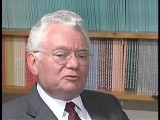
-
Thomas Buergenthal describes international tribunals
Oral HistoryJudge Thomas Buergenthal was one of the youngest survivors of the Auschwitz and Sachsenhausen concentration camps. He immigrated to the United States at the age of 17. Judge Buergenthal devoted his life to international and human rights law. He served as chairman of the United States Holocaust Memorial Museum’s Committee on Conscience; was named the Lobingier Professor of Comparative Law and Jurisprudence at the George Washington University Law School; and served for a decade as the American judge at…
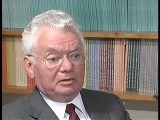
-
Thomas Buergenthal describes operations of international tribunals
Oral HistoryJudge Thomas Buergenthal was one of the youngest survivors of the Auschwitz and Sachsenhausen concentration camps. He immigrated to the United States at the age of 17. Judge Buergenthal devoted his life to international and human rights law. He served as chairman of the United States Holocaust Memorial Museum’s Committee on Conscience; was named the Lobingier Professor of Comparative Law and Jurisprudence at the George Washington University Law School; and served for a decade as the American judge at…
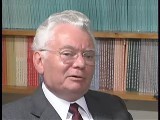
-
Thomas Buergenthal reflects on the importance of memorials
Oral HistoryJudge Thomas Buergenthal was one of the youngest survivors of the Auschwitz and Sachsenhausen concentration camps. He immigrated to the United States at the age of 17. Judge Buergenthal devoted his life to international and human rights law. He served as chairman of the United States Holocaust Memorial Museum’s Committee on Conscience; was named the Lobingier Professor of Comparative Law and Jurisprudence at the George Washington University Law School; and served for a decade as the American judge at…
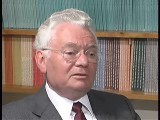
-
Thomas Buergenthal describes the plight of refugees today
Oral HistoryJudge Thomas Buergenthal was one of the youngest survivors of the Auschwitz and Sachsenhausen concentration camps. He immigrated to the United States at the age of 17. Judge Buergenthal devoted his life to international and human rights law. He served as chairman of the United States Holocaust Memorial Museum’s Committee on Conscience; was named the Lobingier Professor of Comparative Law and Jurisprudence at the George Washington University Law School; and served for a decade as the American judge at…
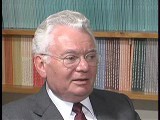
-
Thomas Buergenthal discusses whether it is ever too late to seek justice
Oral HistoryJudge Thomas Buergenthal was one of the youngest survivors of the Auschwitz and Sachsenhausen concentration camps. He immigrated to the United States at the age of 17. Judge Buergenthal devoted his life to international and human rights law. He served as chairman of the United States Holocaust Memorial Museum’s Committee on Conscience; was named the Lobingier Professor of Comparative Law and Jurisprudence at the George Washington University Law School; and served for a decade as the American judge at…
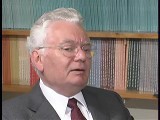
-
Aron (Dereczynski) Derman describes partisan activities near Vilna
Oral HistoryAron was born to a middle-class Jewish family in Slonim, a part of Poland between the two world wars. His parents owned a clothing store. After studying in a technical school, Aron worked as a motion-picture projectionist in a small town near Slonim. The Soviet army took over Slonim in September 1939. War broke out between Germany and the Soviet Union in June 1941. Aron returned to Slonim. The Germans soon occupied Slonim, and later forced the Jews into a ghetto. Aron was forced to work in an armaments…
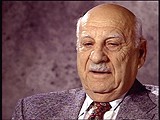
-
David (Dudi) Bergman describes liberation by US Army in mountains near Innsbruck
Oral HistoryThe Germans occupied David's town, previously annexed by Hungary, in 1944. David was deported to Auschwitz and, with his father, transported to Plaszow. David was sent to the Gross-Rosen camp and to Reichenbach. He was then among three of 150 in a cattle car who survived transportation to Dachau. He was liberated after a death march from Innsbruck toward the front line of combat between US and German troops.
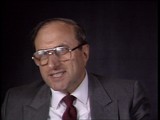
-
Ernest G. Heppner describes learning about the Holocaust and the fate of his relatives
Oral HistoryErnest's family owned a factory that made matzah, the unleavened bread eaten during Passover. In February 1939, three months after Kristallnacht (the "Night of Broken Glass" pogroms), Ernest and his mother fled to Shanghai, one of few havens for refugees without visas. His father and sister stayed behind in Germany; they perished during the Holocaust. A brother escaped to England. Ernest and his mother found work in Shanghai. In 1947, he came to the United States with his wife, whom he met and married in…
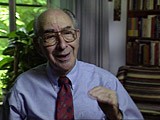
-
Wilek (William) Loew describes forced evacuation from Auschwitz
Oral HistoryWilek was the son of Jewish parents living in the southeastern Polish town of Lvov. His family owned and operated a winery that had been in family hands since 1870. Wilek's father died of a heart attack in 1929. Wilek entered secondary school in 1939. Soon after he began school, World War II began with the German invasion of Poland. Lvov was in the part of eastern Poland annexed by the Soviet Union. Although the Soviets took over Wilek's home and the family business, Wilek was able to continue his…
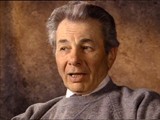
-
Ivo Herzer describes a roundup (from which he was released) of Jews by Croatian collaborators in 1941
Oral HistoryIvo grew up in a middle-class Jewish family in Zagreb. He experienced little overt antisemitism until the Germans and their allies invaded Yugoslavia in April 1941 and installed a fascist Ustasa government in Croatia. The Ustasa regime began killing Jews, Serbs, and Roma (Gypsies). Ivo's family escaped to Italian-occupied territory, where the Italians tried to protect Jewish refugees. Ivo lived in Italian internment camps, including the Rab island camp, before moving to mainland Italy in 1944. He worked…
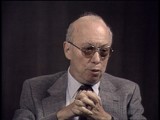
-
Alisa (Lisa) Nussbaum Derman describes a dangerous journey to reach partisan territory in the Naroch Forest, Poland
Oral HistoryLisa was one of three children born to a religious Jewish family. Following the German occupation of her hometown in 1939, Lisa and her family moved first to Augustow and then to Slonim (in Soviet-occupied eastern Poland). German troops captured Slonim in June 1941, during the invasion of the Soviet Union. In Slonim, the Germans established a ghetto which existed from 1941 to 1942. Lisa eventually escaped from Slonim, and went first to Grodno and then to Vilna, where she joined the resistance movement. She…
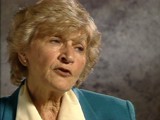
-
Charlene Schiff describes the Soviet occupation of Horochow after the outbreak of World War II
Oral HistoryBoth of Charlene's parents were local Jewish community leaders, and the family was active in community life. Charlene's father was a professor of philosophy at the State University of Lvov. World War II began with the German invasion of Poland on September 1, 1939. Charlene's town was in the part of eastern Poland occupied by the Soviet Union under the German-Soviet Pact of August 1939. Under the Soviet occupation, the family remained in its home and Charlene's father continued to teach. The Germans…
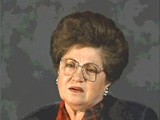
-
Sandor (Shony) Alex Braun describes the death of his father in Kochendorf, a subcamp of Natzweiler
Oral HistoryShony was born to religious Jewish parents in a small Transylvanian city. He began to learn the violin at age 5. His town was occupied by Hungary in 1940 and by Germany in 1944. In May 1944, he was deported to the Auschwitz camp in Poland. He was transferred to the Natzweiler camp system in France and then to Dachau, where he was liberated by US troops in April 1945. In 1950, he immigrated to the United States, and became a composer and a professional violinist.
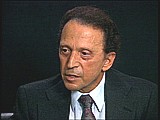
-
Tomasz (Toivi) Blatt describes the selection process in the Sobibor killing center
Oral HistoryTomasz was born to a Jewish family in Izbica. After the war began in September 1939, the Germans established a ghetto in Izbica. Tomasz's work in a garage initially protected him from roundups in the ghetto. In 1942 he tried to escape to Hungary, using false papers. He was caught but managed to return to Izbica. In April 1943 he and his family were deported to Sobibor. Tomasz escaped during the Sobibor uprising. He went into hiding and worked as a courier in the Polish underground.
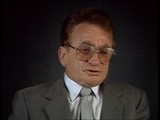
-
Leo Bretholz describes resistance training and activities in a French underground group he joined in 1943
Oral HistoryAfter the Germans annexed Austria in 1938, Leo attempted to flee. He eventually reached Belgium. In 1940 he was deported to the St.-Cyprien camp in France but escaped. In 1942 Leo was smuggled into Switzerland but was arrested and sent back to France, this time to the Rivesaltes and Drancy camps. He and a friend escaped from a train deporting them to Auschwitz in Poland. Leo joined the French underground in 1943. He arrived in the United States in 1947.
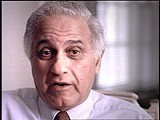
-
Hana Mueller Bruml describes black market activity in the Theresienstadt ghetto
Oral HistoryIn 1942, Hana was confined with other Jews to the Theresienstadt ghetto, where she worked as a nurse. There, amid epidemics and poverty, residents held operas, debates, and poetry readings. In 1944, she was deported to Auschwitz. After a month there, she was sent to Sackisch, a Gross-Rosen subcamp, where she made airplane parts at forced labor. She was liberated in May 1945.
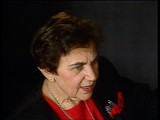
-
Hana Mueller Bruml describes the vibrant cultural life in the Theresienstadt ghetto
Oral HistoryIn 1942, Hana was confined with other Jews to the Theresienstadt ghetto, where she worked as a nurse. There, amid epidemics and poverty, residents held operas, debates, and poetry readings. In 1944, she was deported to Auschwitz. After a month there, she was sent to Sackisch, a Gross-Rosen subcamp, where she made airplane parts at forced labor. She was liberated in May 1945.
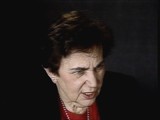
-
Hana Mueller Bruml describes preparations for a Red Cross visit to Theresienstadt
Oral HistoryIn 1942, Hana was confined with other Jews to the Theresienstadt ghetto, where she worked as a nurse. There, amid epidemics and poverty, residents held operas, debates, and poetry readings. In 1944, she was deported to Auschwitz. After a month there, she was sent to Sackisch, a Gross-Rosen subcamp, where she made airplane parts at forced labor. She was liberated in May 1945.
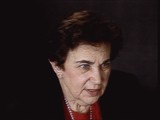
-
Hana Mueller Bruml describes her deportation to and arrival at Theresienstadt
Oral HistoryIn 1942, Hana was confined with other Jews to the Theresienstadt ghetto, where she worked as a nurse. There, amid epidemics and poverty, residents held operas, debates, and poetry readings. In 1944, she was deported to Auschwitz. After a month there, she was sent to Sackisch, a Gross-Rosen subcamp, where she made airplane parts at forced labor. She was liberated in May 1945.
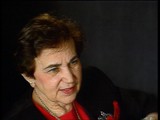
-
Nesse Galperin Godin describes how she met her husband after the war
Oral HistoryNesse's family had a dairy business. The Germans occupied Lithuania in 1941 and established a ghetto in Siauliai. Nesse lived in the ghetto until 1943 when she was old enough to work. In 1944 Nesse, her mother, and a brother were deported to the Stutthof camp near Danzig. Nesse worked in several Stutthof subcamps until January 1945, when the inmates were put on a death march. She was liberated by the Soviets in March. Nesse, her mother, and two brothers survived, and she arrived in the United States in…
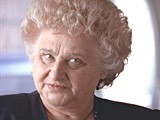
-
Sophie Turner-Zaretsky describes her years in Poland living under a false identity
Oral HistorySophie was born Selma Schwarzwald to parents Daniel and Laura in the industrial city of Lvov, two years before Germany invaded Poland. Daniel was a successful businessman who exported timber and Laura had studied economics. The Germans occupied Lvov in 1941. After her father's disappearance on her fifth birthday in 1941, Sophie and her mother procured false names and papers and moved to a small town called Busko-Zdroj. They became practicing Catholics to hide their identities. Sophie gradually forgot that…
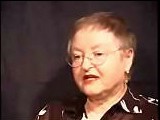
-
Sophie Turner-Zaretsky describes feeling different from other Polish children
Oral HistorySophie was born Selma Schwarzwald to parents Daniel and Laura in the industrial city of Lvov, two years before Germany invaded Poland. Daniel was a successful businessman who exported timber and Laura had studied economics. The Germans occupied Lvov in 1941. After her father's disappearance on her fifth birthday in 1941, Sophie and her mother procured false names and papers and moved to a small town called Busko-Zdroj. They became practicing Catholics to hide their identities. Sophie gradually forgot that…
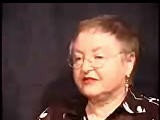
-
Sophie Turner-Zaretsky describes living conditions while in hiding in Poland
Oral HistorySophie was born Selma Schwarzwald to parents Daniel and Laura in the industrial city of Lvov, two years before Germany invaded Poland. Daniel was a successful businessman who exported timber and Laura had studied economics. The Germans occupied Lvov in 1941. After her father's disappearance on her fifth birthday in 1941, Sophie and her mother procured false names and papers and moved to a small town called Busko-Zdroj. They became practicing Catholics to hide their identities. Sophie gradually forgot that…
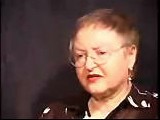
-
Sophie Turner-Zaretsky describes moving to London after liberation and discovering her Jewish heritage
Oral HistorySophie was born Selma Schwarzwald to parents Daniel and Laura in the industrial city of Lvov, two years before Germany invaded Poland. Daniel was a successful businessman who exported timber and Laura had studied economics. The Germans occupied Lvov in 1941. After her father's disappearance on her fifth birthday in 1941, Sophie and her mother procured false names and papers and moved to a small town called Busko-Zdroj. They became practicing Catholics to hide their identities. Sophie gradually forgot that…
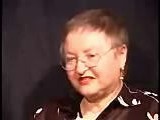
-
Sophie Turner-Zaretsky describes her transition to living in London
Oral HistorySophie was born Selma Schwarzwald to parents Daniel and Laura in the industrial city of Lvov, two years before Germany invaded Poland. Daniel was a successful businessman who exported timber and Laura had studied economics. The Germans occupied Lvov in 1941. After her father's disappearance on her fifth birthday in 1941, Sophie and her mother procured false names and papers and moved to a small town called Busko-Zdroj. They became practicing Catholics to hide their identities. Sophie gradually forgot that…
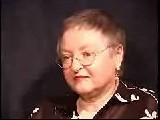
-
Sophie Turner-Zaretsky describes her education in London
Oral HistorySophie was born Selma Schwarzwald to parents Daniel and Laura in the industrial city of Lvov, two years before Germany invaded Poland. Daniel was a successful businessman who exported timber and Laura had studied economics. The Germans occupied Lvov in 1941. After her father's disappearance on her fifth birthday in 1941, Sophie and her mother procured false names and papers and moved to a small town called Busko-Zdroj. They became practicing Catholics to hide their identities. Sophie gradually forgot that…
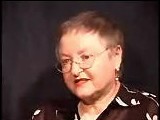
-
Sophie Turner-Zaretsky describes how her teddy bear came into her possession
Oral HistorySophie was born Selma Schwarzwald to parents Daniel and Laura in the industrial city of Lvov, two years before Germany invaded Poland. Daniel was a successful businessman who exported timber and Laura had studied economics. The Germans occupied Lvov in 1941. After her father's disappearance on her fifth birthday in 1941, Sophie and her mother procured false names and papers and moved to a small town called Busko-Zdroj. They became practicing Catholics to hide their identities. Sophie gradually forgot that…
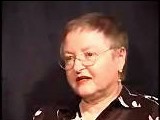
-
Sophie Turner-Zaretsky describes how her teddy bear was given his name
Oral HistorySophie was born Selma Schwarzwald to parents Daniel and Laura in the industrial city of Lvov, two years before Germany invaded Poland. Daniel was a successful businessman who exported timber and Laura had studied economics. The Germans occupied Lvov in 1941. After her father's disappearance on her fifth birthday in 1941, Sophie and her mother procured false names and papers and moved to a small town called Busko-Zdroj. They became practicing Catholics to hide their identities. Sophie gradually forgot that…
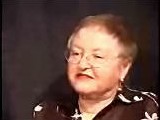
-
Sophie Turner-Zaretsky describes how the teddy bear brings her back to the past
Oral HistorySophie was born Selma Schwarzwald to parents Daniel and Laura in the industrial city of Lvov, two years before Germany invaded Poland. Daniel was a successful businessman who exported timber and Laura had studied economics. The Germans occupied Lvov in 1941. After her father's disappearance on her fifth birthday in 1941, Sophie and her mother procured false names and papers and moved to a small town called Busko-Zdroj. They became practicing Catholics to hide their identities. Sophie gradually forgot that…
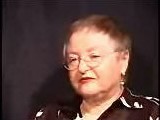
-
Sophie Turner-Zaretsky describes what she would like people to think about when they see her teddy bear
Oral HistorySophie was born Selma Schwarzwald to parents Daniel and Laura in the industrial city of Lvov, two years before Germany invaded Poland. Daniel was a successful businessman who exported timber and Laura had studied economics. The Germans occupied Lvov in 1941. After her father's disappearance on her fifth birthday in 1941, Sophie and her mother procured false names and papers and moved to a small town called Busko-Zdroj. They became practicing Catholics to hide their identities. Sophie gradually forgot that…
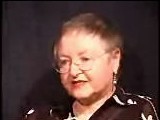
-
Sophie Turner-Zaretsky describes how both she and her bear are survivors
Oral HistorySophie was born Selma Schwarzwald to parents Daniel and Laura in the industrial city of Lvov, two years before Germany invaded Poland. Daniel was a successful businessman who exported timber and Laura had studied economics. The Germans occupied Lvov in 1941. After her father's disappearance on her fifth birthday in 1941, Sophie and her mother procured false names and papers and moved to a small town called Busko-Zdroj. They became practicing Catholics to hide their identities. Sophie gradually forgot that…
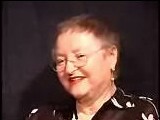
-
Sophie Turner-Zaretsky describes how she began to work through her experience as a hidden child
Oral HistorySophie was born Selma Schwarzwald to parents Daniel and Laura in the industrial city of Lvov, two years before Germany invaded Poland. Daniel was a successful businessman who exported timber and Laura had studied economics. The Germans occupied Lvov in 1941. After her father's disappearance on her fifth birthday in 1941, Sophie and her mother procured false names and papers and moved to a small town called Busko-Zdroj. They became practicing Catholics to hide their identities. Sophie gradually forgot that…
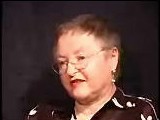
-
Ruth Moser Borsos describes the process of selection for deportations from Westerbork to Auschwitz
Oral HistoryRuth moved to the Netherlands after Kristallnacht (the "Night of Broken Glass") in 1938. She and her father had permits to sail to the United States, but Germany invaded the Netherlands in May 1940 and they could not leave. Ruth was deported to the Westerbork camp in 1943 and to the Bergen-Belsen camp in Germany in 1944. After an exchange agreement with the Allies broke down, Ruth was interned near the Swiss border until liberation by French forces in 1945.
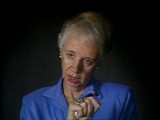
-
Benno Müller-Hill, Antje Kosemund, Paul Eggert, and Elvira Manthey describe the Euthanasia Program
Oral HistoryBenno Müller-Hill, professor of genetics at the University of Cologne and the author of Murderous Science, describes the Nazi "Euthanasia" Program, with oral history excerpts from Antje Kosemund, Paul Eggert, and Elvira Manthey. Antje Kosemund had a disabled younger sister who was admitted to Alsterdorf Institute, Hamburg, December 1933, at the age of three and was subsequently killed in 1944. Paul Eggert was a resident of the orphanage section of the Dortmund-Applerbeck institution from 1942-43 where he…
